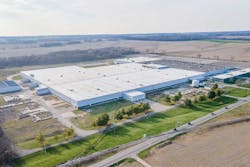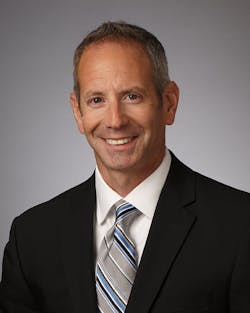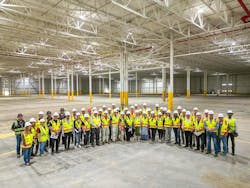Demand for post-consumer recycled (PCR) materials is increasing as brand owners and manufacturers respond to consumers’ heightened awareness of sustainability and recycled content laws for packaging. High-quality recycled PE can be difficult to find, however, particularly for demanding applications such as food packaging.
Nova Chemicals’ Circular Solutions business aims to change that with the launch of its first mechanical recycling facility in Connersville, Ind. Slated to be fully operational by next year, the facility will process post-consumer plastic film to produce Syndigo recycled PE (rPE) resins that can be used in food and non-food contact packaging.
Alan Schrob, director of mechanical recycling at Nova Chemicals, spoke about operating the facility, building the supply chain for rPE and overcoming the challenges of creating a new approach to film recycling.
Why is Nova Chemicals focusing on recycling plastic films?
Schrob: Plastic films are not accepted at many materials-recovery facilities (MRFs) due to their tendency to clog sorting machines. Some retailers sell their packaging films for repurposing and some films are recycled through specific programs, but the reality is that 80 percent of plastic films are going to landfills. Most films that are recycled are turned into different products, re-entering the market in applications with lower quality and purity standards. Although many plastic films are going to waste today, they represent a great opportunity for transitioning to a more circular economy. Back-of-house and distribution-center films, such as stretch film and shrink wrap, provide a clean, consistent and scalable feedstock for producing rPE.
What are the benefits of having a resin supplier like Nova involved in the recycling process?
Schrob: Nova Chemicals has a long history of product stewardship, applications development, technical service and working directly with converters. We know what converters need in a recycled material solution for processability on different types of packaging equipment. We understand the stringent performance requirements that the end product must meet to satisfy their customers.
The Connersville mechanical recycling facility creates opportunities for a closed-loop system. Plastic films can be recycled into high-performing applications like food-contact packaging with Syndigo rPE resins instead of repurposed into downgraded materials. Using our experience and expertise, we can help develop new products and applications using rPE based on the needs and goals of the company.
What makes the Connersville facility different from other MRFs?
Schrob: It employs state-of-the-art recycling technology, including optical sorters, to separate and process different types of films. We closely track the sources and handling of incoming films to create a very high-quality feedstock, which was essential for obtaining the Letter of No Objection (LNO) from the U.S. Food and Drug Administration (FDA) for our food-compliant Syndigo rPE resins. The facility will be operated by Novolex, which has been managing plastic film recycling centers and programs for more than 15 years.
What types of materials will be recycled at the facility?
Schrob: PE packaging films from retail and distribution centers will be processed at the Connersville facility, including pallet wrap, air pillows, bubble wrap, mailer bags and case overwraps. Heavy-duty shipping sacks will also be collected, such as pellet, mulch and ice bags. The facility will produce over 100 million pounds of rPE per year.
What are some of the obstacles Nova has had to overcome while building this operation?
Schrob: One of the challenges of producing recycled materials is the collection and transportation of acceptable plastics to the recycling facility. We are working to overcome this by helping companies develop and implement film collection protocols, making it easy for companies to reduce the amount of plastic waste going to landfills and meet circularity goals.
Another aspect of transitioning to a circular economy is increasing the use of recycled materials. Many brands and retailers have made commitments to include recycled content in their packaging, but some companies have concerns about the performance of rPE and how it can be incorporated into their products. Our team is working with brands and converters to demonstrate the versatility of rPE in a wide variety of applications, including frozen food bags that require high puncture resistance and durability.
Beyond 2025, what does the future look like for the Circular Solutions business and the Connersville facility?
Schrob: To truly change the way plastic is produced and recycled, we need to help the industry change its processes and allow companies to see plastic packaging as an opportunity to grow a circular economy. Plastic films, which were historically difficult to recycle, can now be recycled into packaging and products that companies can reuse in their own facilities and retail operations.
We are also leveraging our network of brand owners and retailers to build a consistent supply of rPE. Collaboration across the value chain will allow mechanical recycling operations to produce high-quality recycled plastics that meet the necessary performance requirements to expand its use, especially in emerging applications such as food packaging made with rPE. We are building something new, but we have to do it together.
About the Author
Alan Schrob
Alan Schrob is director of mechanical recycling at Nova Chemicals. He spent 20 of his 30 years in the plastics industry encouraging circularity in a variety of roles, including business development, marketing and the rigid and performance films markets. His work has involved exploring innovation opportunities for downstream applications in plastics and plastics sustainability and improving plastic circularity.


